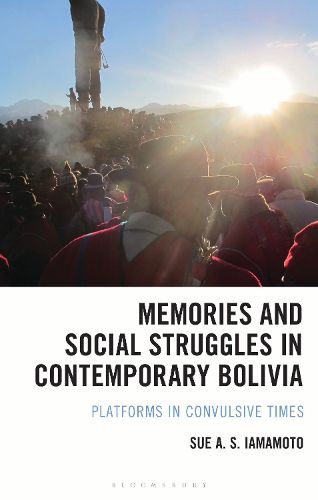Readings Newsletter
Become a Readings Member to make your shopping experience even easier.
Sign in or sign up for free!
You’re not far away from qualifying for FREE standard shipping within Australia
You’ve qualified for FREE standard shipping within Australia
The cart is loading…






Through investigation of three case studies in Bolivia, this book offers an innovative perspective to explain the role of collective memories in moments of intense social struggle and political change.
Memories and Social Struggles in Contemporary Bolivia: Platforms in Convulsive Times examines social memories as functioning, powerful platforms that structure the experience of activists in convulsive times. The first case analyses how the inhabitants of the province of Omasuyos mobilized the memory of the anti-colonial rebellion of Tupac Katari and Bartolina Sisa during the so-called 'Gas War' in 2003. The second case concentrates on how activists in El Alto recalled the War of the Pacific to make sense of the same conflict. Thirdly, this book explores the civic strike in Potosi in 2010 and its relation to the memory of the rise and fall of the Imperial City of Potosi. Sue A. S. Iamamoto argues these memories and narratives have often experienced a path-dependent continuous remembrance through history which is both constitutive and instrumental for the activists claiming it.
$9.00 standard shipping within Australia
FREE standard shipping within Australia for orders over $100.00
Express & International shipping calculated at checkout
Through investigation of three case studies in Bolivia, this book offers an innovative perspective to explain the role of collective memories in moments of intense social struggle and political change.
Memories and Social Struggles in Contemporary Bolivia: Platforms in Convulsive Times examines social memories as functioning, powerful platforms that structure the experience of activists in convulsive times. The first case analyses how the inhabitants of the province of Omasuyos mobilized the memory of the anti-colonial rebellion of Tupac Katari and Bartolina Sisa during the so-called 'Gas War' in 2003. The second case concentrates on how activists in El Alto recalled the War of the Pacific to make sense of the same conflict. Thirdly, this book explores the civic strike in Potosi in 2010 and its relation to the memory of the rise and fall of the Imperial City of Potosi. Sue A. S. Iamamoto argues these memories and narratives have often experienced a path-dependent continuous remembrance through history which is both constitutive and instrumental for the activists claiming it.